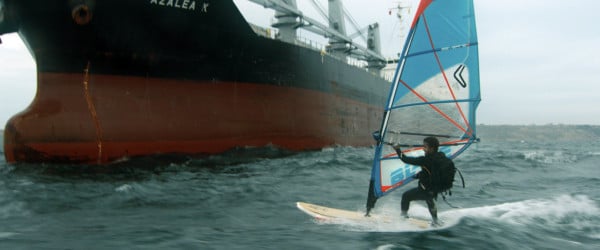
From Morocco to the Ivory Coast to Canada, the Toronto International Film Festival programs films from around the world. Here’s a look at some of the films I caught from Africa and North America at the festival.
“Atlantic”
By far the best film with an African subject that I saw at TIFF, “Atlantic” was directed by Dutch filmmaker Jan-Willem van Ewijk. The film tells the story of a Moroccan windsurfer, Fettah (Fettah Lamara, a real-life windsurfer-turned-actor playing a character very different from himself) who decides to windsurf across 300 km of open ocean en route to Spain. By far the best windsurfer in his town, it’s when he befriends some white American and European windsurfers – whose passports and money give them a kind of freedom he’s never known – who spark in him the desire to leave. The film features gorgeous photography of the Atlantic Ocean and its beaches, and it tells a moving, if sad, story about the difficult choices a man must make when trying to change his fate.
“Run”
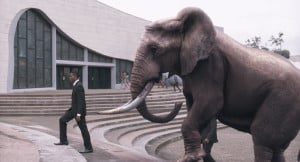
This attempt to recount the political history of Ivory Coast through the life of Run, an orphan turned radical, gets lost in translation, and the stupidity of the protagonist doesn’t help. The film opens on Run shooting the country’s prime minister: He’s in rags, openly holding a gun, and he’s the only person standing and walking down the aisle of the cathedral where the prime minister is speaking. How on earth did he ever get this far without being stopped? If that sounds like an inauspicious start, it only gets worse. We trace Run’s story from adolescence to young adulthood, during which he has to run away from home when he refuses to decapitate a criminal. He moves on to befriend and travel a professional eater before stumbling into a political group as a means of hiding from an angry mob. At each step, he makes the most idiotic decisions possible, even when everyone around him warns him that he’s about to do something stupid. This is trying enough, but the fact that so much of the film seems opaque if you’re not intimately familiar with Ivory Coast politics makes this a tough sell for an international audience.
“Pawn Sacrifice”
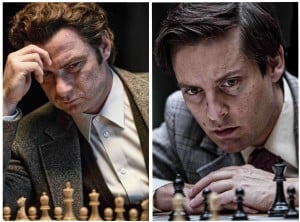
Despite taking its title from a chess strategy, “Pawn Sacrifice” is more interested in personality quirks than the game of chess. The film centers around Bobby Fischer (Tobey Maguire), a Brooklyn child prodigy who grew up playing chess in Washington Square Park before taking on the world champion, Boris Spassky (Liev Schrieber, speaking only in Russian), in one of the most famous chess tournaments in history. Rather than directing our attention toward the chessboard, director Ed Zwick chooses, instead, to focus on Fischer’s fears – of both losing and winning, at different times – and how difficult that made him to be around: He even insisted some of their games be played in the basement coat room because he found the sounds in the designated tournament room to be distracting. There’s an interesting story to be told here, and occasionally the film hints at it when it explores how the chess tournaments were key components of the Cold War. But it never really finds its footing. More than anything else, the film served as a reminder to revisit the excellent “Searching for Bobby Fischer,” still the greatest film made about the game, twenty years after its release.
“Tu Dors Nicole”
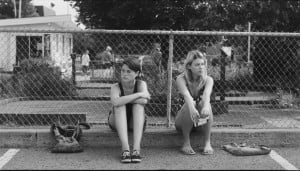
Although the English translation of this Québécois film’s title is “You’re Sleeping Nicole,” the titular character spends all of her nights wide awake with insomnia. She’s in her mid-twenties, living at home in her affluent parents’ suburban house. She has no drive or ambition, and she spends her days working at the local thrift store, where she’s the only one who actually has other options. She may not be sleeping through the night, but she’s sleepwalking through life. The film takes place during one of those long, languorous summers of young adulthood, when you spend your time with friends, trying to keep cool, avoiding growing up. Shot in marvelous black and white, “Tu Dors Nicole” shares its aesthetic, themes and subject matter with Noah Baumbach’s “Frances Ha,” but it doesn’t have the same emotional depth. It’s also more surreal. One of the film’s best gags involves Nicole’s twelve-year-old babysitting charge Martin whose voice has already dropped even though the rest of his body hasn’t changed. He crushes hopelessly on Nicole who dismisses him for his youth, but he’s got more wisdom and warmth than anyone else in the film.
“Tu Dors Nicole” will also screen at the Mill Valley Film Festival on October 10 and 11 (tickets are still on sale).
“Elephant Song”
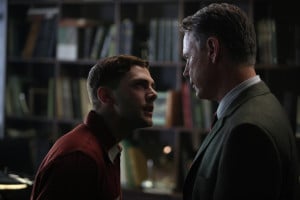
Although best known for writing, directing, and starring in his own features, Canada’s enfant terrible Xavier Dolan (his fifth film “Mommy” won the Jury Prize at Cannes) makes his English language acting debut in Charles Binamé’s 1960s period piece “Elephant Song.” Dolan plays a psychiatric patient, Michael, who finds himself trapped in a room with Dr. Green (Bruce Greenwood), a colleague of his psychiatrist, Dr. Lawrence (Colm Feore), who has gone missing mysteriously. Michael is well aware that he has information Dr. Green needs, and he uses this as an opportunity to manipulate Dr. Green into giving him what he wants. The film’s greatest pleasure is in watching Michael spin his tale, only subtly, slowly and coyly revealing what he wants, and Dolan has a captivating presence. Binamé constantly gives us closeups of Michael’s face throughout, his tears, his eyes or his cheek, mistaking physical closeness for emotional depth and meaning. Ultimately, the script, based on a play, is too busy shouting out its ideas that it ends up being more of an intellectual exercise than an emotionally involving story.
